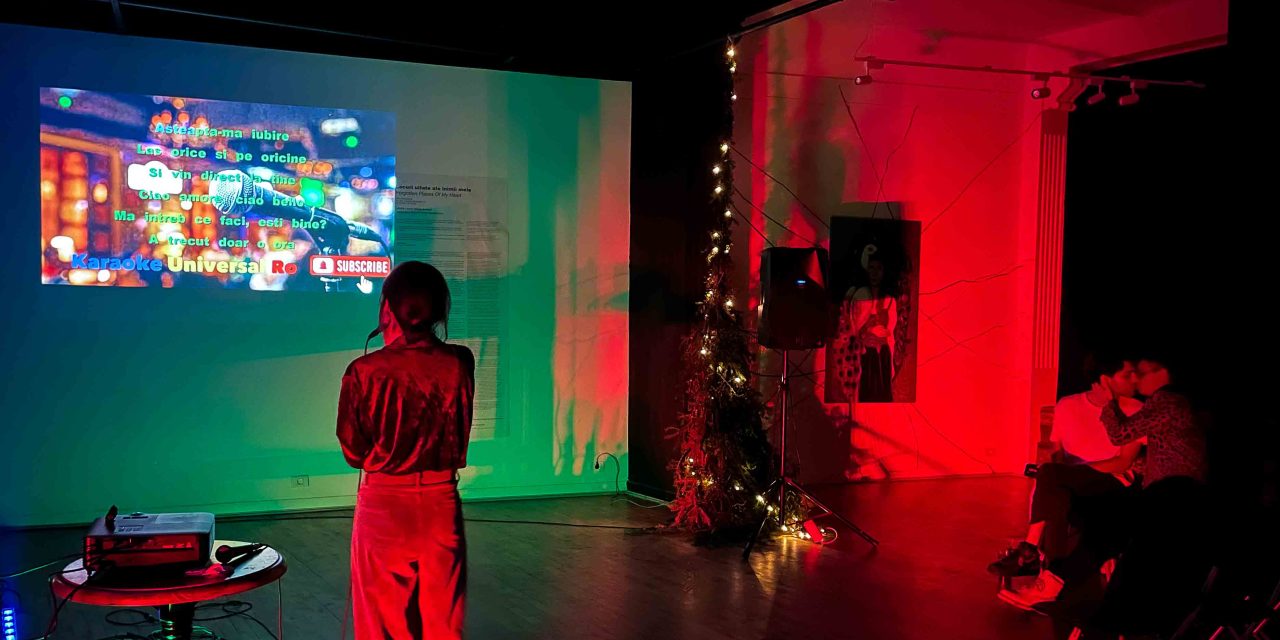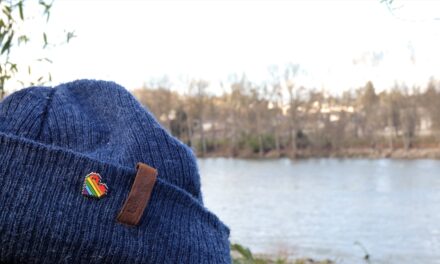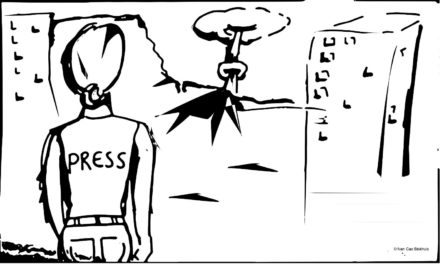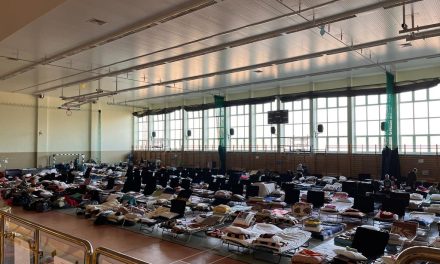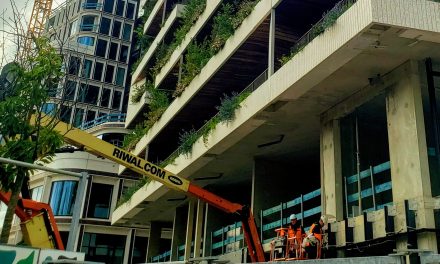Anti-queer rhetoric is on the rise all across Europe. Countries such as Hungary and Poland have been receiving harsh backlash for their outwardly cultural homophobic rhetoric. In recent years, these countries have been implementing and enforcing laws that are notably anti-LGBTQ+. One of Hungary’s neighbours, Romania, appears to be the newest hotspot for these bigoted ideals.
Feelings of fear and unsafety among LGBTQ+ people in these areas are not unwarranted. ILGA Europe’s (European region of the International Lesbian, Gay, Bisexual, Trans and Intersex Association) report from 2022 found that outright homophobia leading to hate crimes is on the rise even in countries with previously high acceptance rates. This has left regions previously lacking LGBTQ+ support in considerably worse condition.
Being queer in Romania
Romania’s society is extremely conservative and Christian Eastern Orthodox religion plays a major role in the lives of many of its citizens. Often bigotry against non-conforming groups increases in conservative and religious regions, which can lead to hostile circumstances and occasionally put minorities in legitimate danger.
‘A long way to go for LGBTI equality,’ a survey conducted in 2012 and again in 2019, reported on the queer acceptance levels in 30 European countries (EU and non-EU). The survey found 81% of people avoid physical contact with same-sex partners in public spaces throughout Romania, and 44% are in constant avoidance of certain regions out of fear of being physically assaulted.
From 2012 to 2019 there was a 25% increase of queer people who are less open about being LGBT+ in Romania, whether with family/friends or the general public.
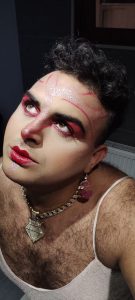
Ramya, Bucharest Romania, 2022
Raj Alexandru is a queer performer, DJ, and LGBT+ rights activist in Bucharest. They have experienced the difficulties that accompany reckoning with both gender identity and sexual orientation while living in areas which lack acceptance. For the past six years Raj has performed as a drag queen under the name Ramya. Though they began to recognize that Ramya was more than just a stage presence. “Ramya is the fem part of my soul, I have a male and female part of myself,” they said, “when I discovered Ramya, I discovered that I am a gender fluid person”
It took Raj many years to come to terms with their self expression both personally and publicly. Being born and raised in a small Romanian village, Raj was raised very traditionally and was not exposed to queerness or differing gender expressions. As a result, Raj had never reckoned with that side of themselves until adulthood.
During their final year at university, where they were studying theatre, Raj began to question their sexuality which resulted in alienation from both within the school and from friends. “It was hard because I was rejected from the faculty and I was required to do all my final exams alone, because I was gay,” they explained.
Though, after finishing their degree and moving to Bucharest, Raj began to find like minded individuals, a community, and safe spaces to be themselves.
Finding a support system
Paula Dunker is a queer activist, performer, and writer based in Bucharest, since the initial meeting, Raj and Paula have begun to work together often on curating events and performances. Though not biologically related, Paula and Raj see each other as sisters more than friends or colleagues, which they believe is a testament to the support provided within the queer community.
Paula is a member of the queer performing act duo called #FLUID, where she works with musician Alex Bălă. This performance art group employs the use of a combination of sounds, music, and a microphone to create their art.
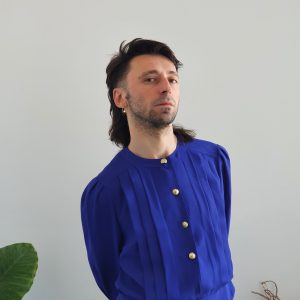
Paula, Bucharest Romania, 2022
The queer community which has been built within the city of Bucharest is vibrant and strongly connected as it continues to grow. “This is the capital, It’s the real world here. If you travel a little bit out of the city, it’s not so,” said Paula.
Paula worked on a performance about the process of coming out, often a major challenge for queer youth in conservative areas. This performance was presented to youth in small towns outside the city. “I think it’s even harder for them. It’s a big city versus a small city and everything is different.” she said.
Though, queer life in the city continues to present its own challenges as there are few safe areas for LGBTQ+ people. “We have shows, we have performers, we have speakers, we have kids that are out and we are very proud of them, the main thing is that we don’t have safe spaces,” Raj said.
A lack of safe spaces is a major part of what Raj tries to address with the community. Outside their work as a performer and event organizer, they work on creating and curating safe spaces for the Bucharest Queer community.
“Most of the time I’m creating these spaces. Sometimes I’m doing educational or cultural interventions and educational theatre in different cities in Romania with different people,” Raj said. “I’m going to make awareness and put this bridge between normativity and queerness,” they continued.
Anti-LGBTQ+ rhetoric on the rise
ILGA-Europe’s report forecast for 2019 found a sharp rise of hate speech and determined that the increase can be tied back to public officials who often make outwardly anti-queer statements to their public. 2019 also saw a rise in major movements of open anti-LGBT hate across Europe, most notably with Poland’s dramatic turn towards overt homophobia both culturally and legislatively.
In Romania, homosexuality is not prohibited by any law, however, gay marriage has not been legislatively recognized. In 2020 it was found that 74.9% of the population believe homosexuality is completely unjustifiable in Romanian culture.
Raj explains that they are acutely aware of the challenges and the fear of living out and proud in Romania. “It’s risky but I’m happy. It’s risky at a level I can’t control and that is very scary for me, but what else can I do?” they said.
People dancing at queer event, Bucharest Romania, 2022In June of 2020 the Romanian government drafted a law to ban ‘activities aimed at spreading gender identity theory or opinion’ in educational settings. The ban violated the idea of sex-based equality as it disproportionately discriminated against transgender, nonbinary, gender-nonconforming, and intersex individuals.
This law sought to prohibit any elements of non-traditional gender identities being presented to children. This created challenges for all transgender, non-binary, and intersex children—for whom withholding information about gender identity could have detrimental effects on their physical and mental wellbeing.
In June of 2020, #FLUID performed at the National Museum of Contemporary Art (MNAC) in Bucharest. During this performance, Paula read a manifesto which implored people
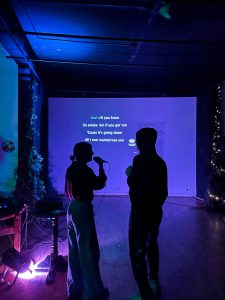
Queer performer event night, Bucharest Romania, 2022
to be a queer ally and to support the Black Lives Matter movement. Making this political statement opened Paula to criticisms from people who disagreed with her stance.
“All the Christians exploded on me, I’m aware I was provoking them with political statements… but every two or three minutes I would get hate messages and even death threats online,” she said. This continued for weeks.
She explained that the most difficult part of that time came from within the queer community questioning her actions. “People were saying to me you should not be scandalous, or provoking because we are the minority,” she said, “that was really hard, I needed support not questioning” she concluded.
Trying to holding strong
Even with the support of those around you, Raj still believes life as an open and honest person is challenging. “It’s hard to be a free person in Romania. Doesn’t matter the gender, sexual orientation, or anything, it’s just hard to be a free person here.”
Despite all the difficulties that accompany queer life in Romania and in all society today, Raj says they finally feel content with their choices and confident in themselves. “Yeah, it’s hard and you need to be very courageous to do this. But I realized that it’s more important to be happy than to be the same as everyone else,” they concluded.
